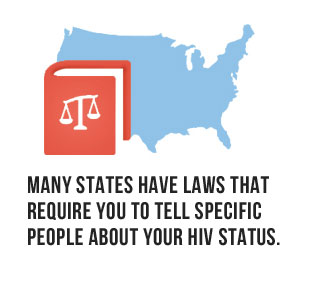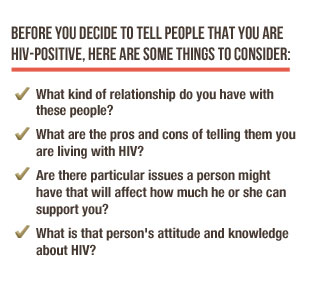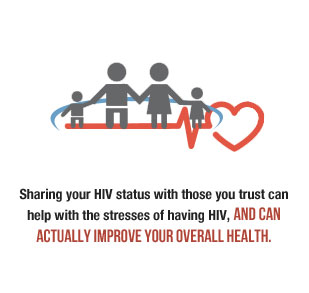Sharing Your HIV Status
After you are diagnosed with HIV, you will have to decide whether to share that information with other people, and—if so—whom you should tell.
It is very important that you talk to your current and past sexual partners about your HIV status. If you have shared needles with others to inject drugs, you need to tell them too. If you are afraid or embarrassed to tell them yourself, the health department in your area can notify your sexual or needle-sharing partners that they may have been exposed to HIV without giving your name.
Disclosure can be a tough process, but you don’t have to face it alone. Talk to your healthcare provider and ask for help in finding support groups or other individuals who can help you in the disclosure process.
Sharing your HIV status with those you trust—such as family members, friends, and children—can help with the stresses of having HIV, and can actually improve your overall health. Disclosing your status to your healthcare provider is important to make sure that you receive the best care for your HIV.
In most cases, sharing your HIV status is a personal choice—but it may also be a legal requirement. Many states have laws that require you to tell specific people about your HIV status. For more information, see the American Civil Liberties Union’s State Criminal Statutes on HIV Transmission ![]() .
.
Before you decide to tell people that you are HIV-positive, here are some things to consider:
- Think about the people you rely on for support, like family, friends, or coworkers.
- What kind of relationship do you have with these people? What are the pros and cons of telling them you are living with HIV?
- Are there particular issues a person might have that will affect how much he or she can support you?
- What is that person's attitude and knowledge about HIV?
- Why do you want to disclose to this person? What kind of support can this person provide?
- For each person you want to tell, ask yourself if the person needs to know now—or if it’s better to wait.
For more information, see the Office on Women's Health’s Revealing Your HIV Status.
Fact Sheets & Print Materials
- Project Inform - Telling Others About Your HIV: things to consider when deciding to disclose your HIV status to others in your life

Related Topics on AIDS.gov
Frequently Asked Questions
Do I have to tell anyone about having HIV?
While the specifics and penalties of HIV disclosure laws vary from state to state, most states require that all HIV-positive persons disclose their status to all past, present, and future sexual partners, as well as all attending medical professionals (doctors, dentists, etc.). The local health department can assist in telling your former sexual partners or others who may have been exposed to HIV through you.
Additional Resources
- National Library of Medicine (PubMed) - Social support, disclosure, and use of antiretroviral therapy
- CDC - HIV Partner Counseling and Referral Services
- CDC - Healthy Relationships: Prevention for Positives
Healthy Relationships is a multisession, small-group, skills-building program for men and women living with HIV/AIDS. The program is designed to reduce participants’ stress related to safer sexual behaviors and disclosure of their serostatus to family, friends, and sex partners.
Last revised: 08/23/2009



